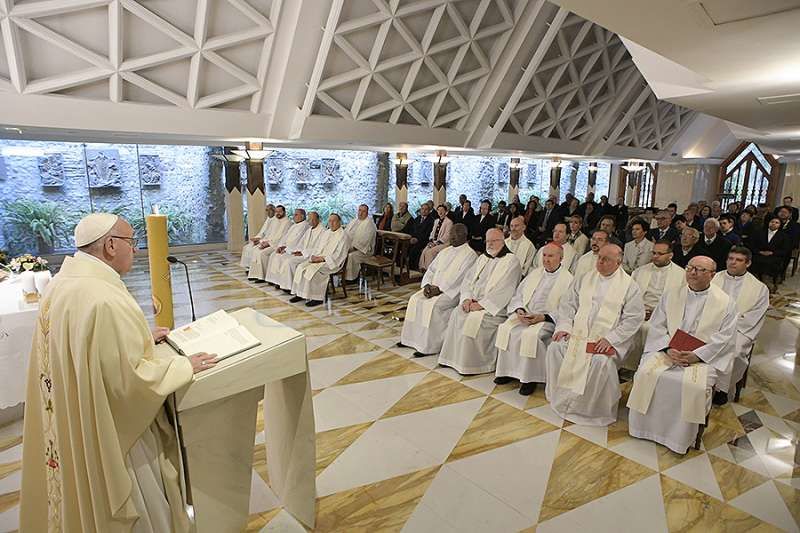In his homily Tuesday, Pope Francis said the Church needs men and women who are capable not only of bearing prophetic witness to the truth, like the early martyrs, but who are also examples of hope.
In looking to Christ's words and actions in scripture, on one hand he “corrected with strong words: 'perverse and adulterous generations,'” yet on the other hand he wept for the people of Jerusalem when they rejected God's ways, the pope said April 17.
Likewise, a true prophet is not a “prophet of misfortunes,” speaking only of things that need to be corrected, but he is also “a man of hope; he corrects when needed and opens wide the doors looking to the horizon of hope.”
A prophet, he said, “restores the roots, restores one's belonging to the people of God in order to go forward.”
Pope Francis spoke during his Mass in the chapel of the Vatican's Saint Martha guesthouse, focusing on the day's first reading from the Acts of the Apostles, which recounts the stoning of Stephen, the Church's first martyr.
When Stephan was speaking to the scribes, their hearts were closed and they didn't want to listen to what he had to say, so they became infuriated and began to attack him, Francis said, noting that many of the prophets who preceded Christ were treated in the same way.
“When the prophet arrives to the truth and touches the heart, either the heart opens or the heart becomes more like stone and anger, persecution, are unleashed. This is how the life of a prophet ends.”
Truth, the pope observed, is often uncomfortable and hard to accept. Because of this, the prophets were always persecuted when speaking the truth.
“But what for me is the test that a prophet undergoes when he tells the truth strongly? It's when this prophet is capable of not only speaking, but crying for the people who have abandoned the truth [Jesus gave strong rebukes, but he also wept]. This is the test. A true prophet is the one who is capable of crying for his people and also saying things strongly when he has to. [A prophet] is not timid, he is always like this: direct,” but full of hope.
Francis then noted how Stephen was killed in the presence of Saul, who would later become St. Paul.
Quoting a phrase from Tertullian, Francis said, “the blood of the martyrs is the seed of Christians.”
The Church, he said, “needs prophets...it needs all of us to be prophets.” But prophets are different than critics, he said, explaining that a critic is a person who does not approve of anything or anyone, and “this is not a prophet,” this is another thing.
“The prophet is someone who prays, who looks to God, who looks to his people, who feels pain when the people go astray, who cries,” the pope said, praying that “the Church never lacks this prophecy of service, to always go forward.”

